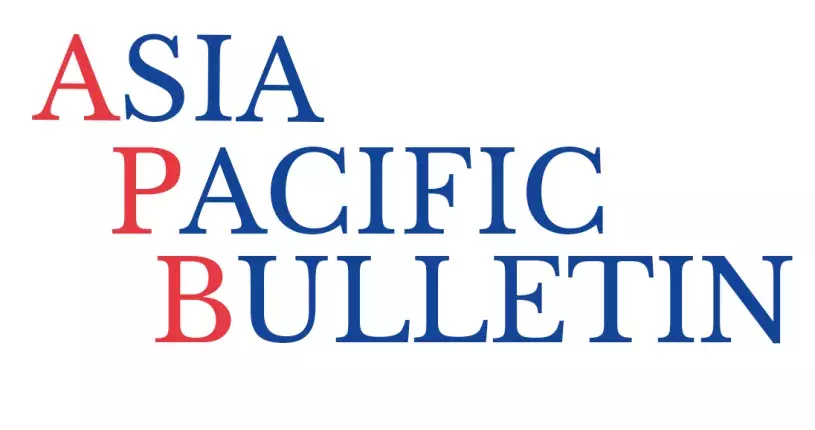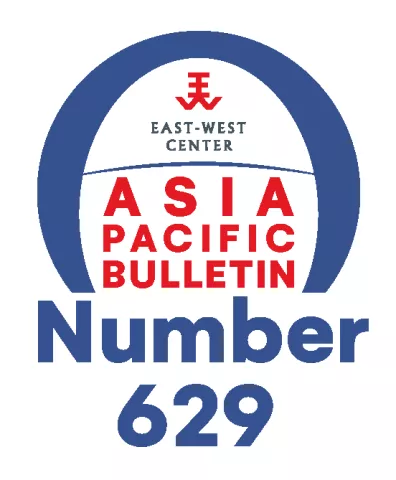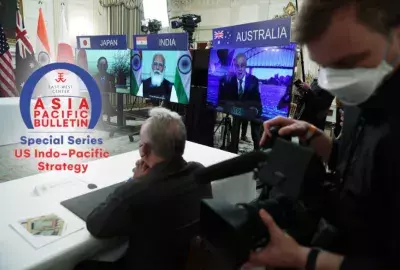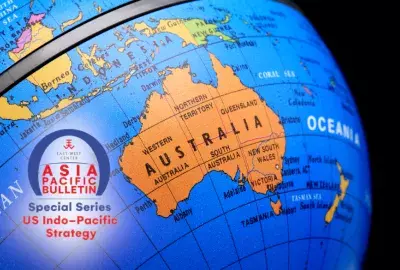Error message


| Dr. Thomas Schaefer, German ambassador to North Korea (2007-2010 and 2013-2018) and author of "From Kim Jong Il to Kim Jong Un: How the Hardliners Prevailed," explains how Germany has "sought to moderate North Korea through a 'Policy of Critical Engagement' to convince it of the benefits of international cooperation, respect for the rule of law, and improving the political and economic situation of its people." |
| for additional titles in the Asia Pacific Bulletin |
| This article is a part of the North Korea in the World Special Series, a joint project between the National Committee on North Korea and the East-West Center that examines North Korea's external relations. |
Germany established diplomatic relations with North Korea, also known as the Democratic People's Republic of Korea (DPRK), in 2001 at the request of the South Korean government, which hoped that Germany and the European Union (EU) would play a more active role in supporting the “Sunshine Policy.” Since then, Germany, together with the other EU states, has sought to moderate North Korea through a “Policy of Critical Engagement” to convince it of the benefits of international cooperation, respect for the rule of law, and improving the political and economic situation of its people. In doing so, Germany could build on the long relationship between North Korea and the former East Germany.
“Critical engagement” means being willing to talk and get involved, but without holding back on criticism—and, if need be, imposing sanctions. It also implies that comprehensive engagement is not (yet) possible because of the circumstances. There is ample cause for a constrained approach from North Korea’s aggressive foreign policy and systematic human rights violations to the absence of suitable economic and fiscal conditions for business and development cooperation. Moreover, the lack of will on the part of considerable segments of the North Korean regime to engage with other countries also hampers broader engagement.
For Pyongyang, establishing diplomatic relations was a success in its ambition to diversify its foreign relations as North Korea sought German support in the fields of business and science. Among other things, it hoped for German investment in the city of Hamhung, the reconstruction of which had been generously supported by East Germany after the Korean War. Advice on how to manage a national unification, however, was not welcome as Pyongyang fears the example set by the revolting East German population and its “absorption” by the West.
Berlin, on the other hand, considered progress on policy issues to be an essential condition for greater engagement in the economic field. It was primarily concerned with intensifying the political dialogue. In 2014, for example, it supported a trip to Germany by Politburo member Kang Sok Ju. For North Korea, which had not received an invitation to Germany of that sort for some time, the invitation was a political incentive. Germany, for its part, hoped to strengthen voices in DPRK leadership that seemed to advocate reforms.
Over the years, Germany has tried to build trust with North Korea through open political dialogue. To this same end, Germany funded humanitarian aid projects in North Korea, focusing on agriculture, forestry, and the environment. However, these projects were discontinued as political circumstances worsened. Berlin also offers Pyongyang advice on economic reforms, special economic zones, investment, and tourism. Bilateral cooperation includes educational and cultural activities such as German language instruction, medical training, scholarships, film events, collaborations in the field of music, support in the restoration of old temples, the establishment of a library, and the construction of two pavilions in the traditional Korean style on the grounds of the embassy.
The balance sheet is mixed. In political terms, these confidence-building exercises reinforced North Korea’s view of Germany as a critical and reliable partner that stands by its word. From a technical point of view, however, the outcome is less positive. The impact of many international projects in North Korea—be they organized by Germany or other international partners—remains limited; we also experienced some failures, and many good ideas could not be implemented. This was not because the implementing organizations commissioned by the German side had not worked properly. Rather, the political conditions in North Korea are so bad that international project cooperation hardly ever produces truly satisfactory results.
The “Policy of Critical Engagement,” as a mixture of incentives, (more or less vocal) criticism, and sanctions has been pursued not only by Germany and its European partners. At times, South Korea, the United States (which in 2008 staged a memorable concert by the New York Philharmonic), China, and even Russia have tried this strategy. It has not, however, prevented Pyongyang from pushing ahead with its nuclear weapons program and intensifying internal repression in the last years of Kim Jong Il’s reign and, especially, since Kim Jong Un took office. The international community has increasingly responded to nuclear and missile tests with sanctions imposed by the United Nations Security Council, groups of states such as the EU, or individual states. Germany, for example, responded to the second nuclear test in 2009 by ceasing cooperation in the fields of the natural sciences, engineering, mathematics, and information technology, among other things. This decision was predicated on concerns that the knowledge gained at German universities would ultimately be employed in DPRK weapons programs. A few years later, all scholarship programs for longer studies in Germany were discontinued, as they might have been used for illegal purposes. Other bilateral sanctions included the reduction of North Korean embassy staff in Berlin—which, of course, led to corresponding reductions of German embassy staff in Pyongyang.
And yet: the Policy of Critical Engagement remains the best approach even when Pyongyang does not want to engage. Unfortunately, it takes two to tango.
The North Korean leadership views any cooperation with foreign countries as a latent threat to the regime’s stability, against which safeguards must be taken. Throughout my extended stay in North Korea, there were, however, differing opinions in the leadership not only about the nature and extent of the safeguards but also about the extent to which cooperation with foreign countries was admissible, if at all. In case of doubt, foreclosure of the country and preventing the infiltration of “foreign ideas” was more important to many than economic development or humanitarian aid. The longstanding opposition of the military to the Kaesong Industrial Zone—although it was one of Kim Jong Il’s pet projects—and the lengthy closures of the entire country during the Ebola crisis in the winter of 2014-2015 and since the outbreak of the Covid pandemic are glaring examples of this. Differences of opinion in the leadership were also notable in nuclear policy, budget priorities, relations with South Korea, and economic reform. In the last ten years, hardliners have increasingly shaped the country’s policy.
In the interest of developing realistic negotiating positions, it is of crucial importance to obtain a better understanding of policy discussions within North Korea’s ruling elite, the power structures at play within DPRK leadership, and the way political objectives are being advocated and decided within these circles. Countries, like Germany, with people on the ground that have the opportunity to continuously engage with North Korean officials and feel the pulse (albeit only until the outbreak of Covid) can contribute to the international community’s knowledge about these issues. At the same time, countries like Germany can convey a realistic picture of the world’s thinking to DPRK leaders.

| Dr. Thomas Schaefer, German ambassador to North Korea (2007-2010 and 2013-2018) and author of "From Kim Jong Il to Kim Jong Un: How the Hardliners Prevailed," explains how Germany has "sought to moderate North Korea through a 'Policy of Critical Engagement' to convince it of the benefits of international cooperation, respect for the rule of law, and improving the political and economic situation of its people." |
| for additional titles in the Asia Pacific Bulletin |
| This article is a part of the North Korea in the World Special Series, a joint project between the National Committee on North Korea and the East-West Center that examines North Korea's external relations. |
Germany established diplomatic relations with North Korea, also known as the Democratic People's Republic of Korea (DPRK), in 2001 at the request of the South Korean government, which hoped that Germany and the European Union (EU) would play a more active role in supporting the “Sunshine Policy.” Since then, Germany, together with the other EU states, has sought to moderate North Korea through a “Policy of Critical Engagement” to convince it of the benefits of international cooperation, respect for the rule of law, and improving the political and economic situation of its people. In doing so, Germany could build on the long relationship between North Korea and the former East Germany.
“Critical engagement” means being willing to talk and get involved, but without holding back on criticism—and, if need be, imposing sanctions. It also implies that comprehensive engagement is not (yet) possible because of the circumstances. There is ample cause for a constrained approach from North Korea’s aggressive foreign policy and systematic human rights violations to the absence of suitable economic and fiscal conditions for business and development cooperation. Moreover, the lack of will on the part of considerable segments of the North Korean regime to engage with other countries also hampers broader engagement.
For Pyongyang, establishing diplomatic relations was a success in its ambition to diversify its foreign relations as North Korea sought German support in the fields of business and science. Among other things, it hoped for German investment in the city of Hamhung, the reconstruction of which had been generously supported by East Germany after the Korean War. Advice on how to manage a national unification, however, was not welcome as Pyongyang fears the example set by the revolting East German population and its “absorption” by the West.
Berlin, on the other hand, considered progress on policy issues to be an essential condition for greater engagement in the economic field. It was primarily concerned with intensifying the political dialogue. In 2014, for example, it supported a trip to Germany by Politburo member Kang Sok Ju. For North Korea, which had not received an invitation to Germany of that sort for some time, the invitation was a political incentive. Germany, for its part, hoped to strengthen voices in DPRK leadership that seemed to advocate reforms.
Over the years, Germany has tried to build trust with North Korea through open political dialogue. To this same end, Germany funded humanitarian aid projects in North Korea, focusing on agriculture, forestry, and the environment. However, these projects were discontinued as political circumstances worsened. Berlin also offers Pyongyang advice on economic reforms, special economic zones, investment, and tourism. Bilateral cooperation includes educational and cultural activities such as German language instruction, medical training, scholarships, film events, collaborations in the field of music, support in the restoration of old temples, the establishment of a library, and the construction of two pavilions in the traditional Korean style on the grounds of the embassy.
The balance sheet is mixed. In political terms, these confidence-building exercises reinforced North Korea’s view of Germany as a critical and reliable partner that stands by its word. From a technical point of view, however, the outcome is less positive. The impact of many international projects in North Korea—be they organized by Germany or other international partners—remains limited; we also experienced some failures, and many good ideas could not be implemented. This was not because the implementing organizations commissioned by the German side had not worked properly. Rather, the political conditions in North Korea are so bad that international project cooperation hardly ever produces truly satisfactory results.
The “Policy of Critical Engagement,” as a mixture of incentives, (more or less vocal) criticism, and sanctions has been pursued not only by Germany and its European partners. At times, South Korea, the United States (which in 2008 staged a memorable concert by the New York Philharmonic), China, and even Russia have tried this strategy. It has not, however, prevented Pyongyang from pushing ahead with its nuclear weapons program and intensifying internal repression in the last years of Kim Jong Il’s reign and, especially, since Kim Jong Un took office. The international community has increasingly responded to nuclear and missile tests with sanctions imposed by the United Nations Security Council, groups of states such as the EU, or individual states. Germany, for example, responded to the second nuclear test in 2009 by ceasing cooperation in the fields of the natural sciences, engineering, mathematics, and information technology, among other things. This decision was predicated on concerns that the knowledge gained at German universities would ultimately be employed in DPRK weapons programs. A few years later, all scholarship programs for longer studies in Germany were discontinued, as they might have been used for illegal purposes. Other bilateral sanctions included the reduction of North Korean embassy staff in Berlin—which, of course, led to corresponding reductions of German embassy staff in Pyongyang.
And yet: the Policy of Critical Engagement remains the best approach even when Pyongyang does not want to engage. Unfortunately, it takes two to tango.
The North Korean leadership views any cooperation with foreign countries as a latent threat to the regime’s stability, against which safeguards must be taken. Throughout my extended stay in North Korea, there were, however, differing opinions in the leadership not only about the nature and extent of the safeguards but also about the extent to which cooperation with foreign countries was admissible, if at all. In case of doubt, foreclosure of the country and preventing the infiltration of “foreign ideas” was more important to many than economic development or humanitarian aid. The longstanding opposition of the military to the Kaesong Industrial Zone—although it was one of Kim Jong Il’s pet projects—and the lengthy closures of the entire country during the Ebola crisis in the winter of 2014-2015 and since the outbreak of the Covid pandemic are glaring examples of this. Differences of opinion in the leadership were also notable in nuclear policy, budget priorities, relations with South Korea, and economic reform. In the last ten years, hardliners have increasingly shaped the country’s policy.
In the interest of developing realistic negotiating positions, it is of crucial importance to obtain a better understanding of policy discussions within North Korea’s ruling elite, the power structures at play within DPRK leadership, and the way political objectives are being advocated and decided within these circles. Countries, like Germany, with people on the ground that have the opportunity to continuously engage with North Korean officials and feel the pulse (albeit only until the outbreak of Covid) can contribute to the international community’s knowledge about these issues. At the same time, countries like Germany can convey a realistic picture of the world’s thinking to DPRK leaders.







